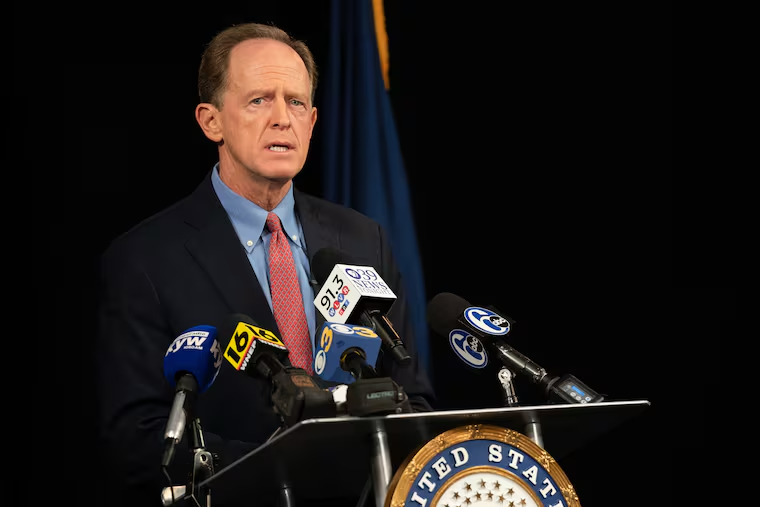Term limits can end the entrenched partisan politics that put our country in crisis | Opinion
Days after announcing he will not seek reelection, Sen. Pat Toomey joins former Gov. Ed Rendell to support limiting how long members of Congress can serve.

In these partisan times, one might ask what a Democratic governor and a Republican senator from Pennsylvania could possibly have in common.
The answer is: Moving forward, we both believe that members of Congress should be subject to term limits. And Pennsylvania can help make that happen.
We recall a time not too long ago when the House and Senate could regularly put divisions aside to address the big issues facing our country. Think of the early 2000s when, in response to the terrorist attacks on Sept. 11, Congress overwhelmingly approved several measures that created the Department of Homeland Security, established more stringent safety guidelines at airports, and helped Ground Zero first responders.
» READ MORE: Pat Toomey just made the 2022 elections in Pennsylvania a total free-for-all
Now, in the midst of another crisis, members of Congress frequently focus more on blaming each other than on finding solutions. Entrenched politicians have been steering the ship of state for decades and — don’t look now — we’re about to hit a $25 trillion national debt iceberg. It’s time for a new approach.
Our elected representatives seem afraid to do anything that would jeopardize their reelection. Term limits allow them to operate without that pressure, secure in the knowledge that they are not risking the position that could be a lifetime career. They would be able to cast votes knowing that the risk they are taking would not jeopardize their entire future.
Seventy-nine percent of Pennsylvanians support term limits on Congress, including supermajorities of Republicans, Democrats, and independents. It’s hard to find common sense in Washington, D.C., and, believe us, we’ve looked. But that’s not to say common sense is extinct. You can still find it all over Pennsylvania, from the high-tech hubs along Route 202 to the research labs, factories, and foundries of Pittsburgh, and everywhere in between. If you’re with us on congressional term limits, that just means you trust the people more than the political elite. Who could argue with that?
Now, there are some who say term limits would deprive Congress of legislative experience, and that professional politicians are the only people qualified to lead. We disagree. Term limits would infuse Congress with real-world experience, perspectives, and sensibilities that are often missing. Term limits would replace the smirking class with the working class.
» READ MORE: Should Supreme Court justices have term limits? | Pro/Con
By now you’re probably saying, “OK, OK, I’m for term limits, too, but it’s not going to happen. What politician would vote himself out of a job?”
Thankfully, the brilliance of our Constitution solves that dilemma. The U.S. Supreme Court has ruled that congressional term limits may only be enacted by a constitutional amendment. The Constitution provides two methods of proposing term limits amendment: It can be done by either a two-thirds vote of Congress (which is unlikely to happen) or by a convention of states to propose an amendment, which is convened by state legislatures.
That means state legislatures, including the Pennsylvania General Assembly in Harrisburg, have the power to bypass Washington, D.C. and deliver congressional term limits for the American people. Under the Constitution, once 34 states have applied for a convention limited to congressional term limits, Congress shall call such a convention to which each state would send delegates.
The convention could then propose appropriate term limits for Congress, which would have to be ratified by 38 state legislatures before becoming part of the Constitution.
Our system will not be fixed by those who broke it. Without enormous pressure, members of Congress will never vote to limit their own power and influence. With that in mind, we call on the Pennsylvania General Assembly to get the ball rolling by passing a resolution applying a congressional term limits convention.
» READ MORE: Coming to terms with term limits in Pennsylvania’s legislature | John Baer
We leave you with the words of a great Pennsylvanian — and fellow supporter of term limits — Benjamin Franklin:
“In free governments, the rulers are the servants, and the people their superiors. ... For the former to return among the latter does not degrade, but promote them.”
We couldn’t agree more. Let’s work on something our country is united behind, and increase faith in government. Let’s place term limits on Congress.
Pat Toomey is a senator from Pennsylvania. Long a supporter of term limits, he announced this week that he will not seek reelection or run for higher office. Ed Rendell is the former governor of Pennsylvania.